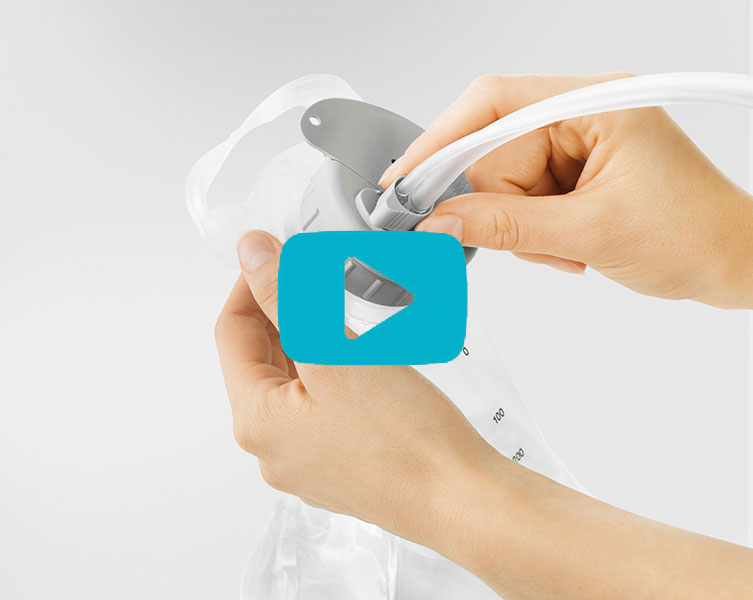Peristeen Plus Frequently Asked Questions
Even if you’re confident using Peristeen Plus and enjoying good results, it’s not uncommon to have questions. Always reference the Instructions for Use (IFU) for guidance or you can always call Coloplast® Care at 1-855-605-7594. (Monday-Friday, 8am-6pm CST) to speak with our dedicated Advisors, who can offer product and lifestyle support.
The Basics
How do I start using Peristeen Plus?
The Peristeen Plus Transanal Irrigation System is indicated for use by adults and children (2 years and older) with neurogenic bowel dysfunction who suffer from fecal incontinence, chronic constipation, and/or time-consuming bowel management procedures. It is vital for your safety that you consult a physician/healthcare professional trained in the use of Peristeen Plus Transanal Irrigation before performing the irrigation procedure.
You must receive thorough instructions from a healthcare professional before using this product. Your first irrigation must be supervised by a healthcare professional.
How do I get access to Peristeen Plus?
Individuals must be assessed by a qualified healthcare professional to ensure this bowel management method is appropriate for them. Prior authorization is usually required. For more information, please click here. Your supplier will work with your prescribing clinician on the prior authorization process. Once you are approved and have received your initial supplies, consult your clinician to schedule your product training. Do not start to use the product before training with your provider first.
Should I eat before or after the procedure?
While there is no set rule, most clinicians agree that irrigating 20-30 minutes after a meal or snack helps take advantage of the bowel stimulation that naturally occurs during digestion. Finding and sticking to a set time for your irrigations can help.
What should I do if irrigation water and/or feces do not come out?
You may be dehydrated and your bowel has absorbed the irrigation water as a result. Wait a day and try again at the same time. If the same thing happens, the Coloplast Care team will be able to advise you. You may also need to adjust the amount of water being used for your irrigation. Always contact your healthcare provider before making any adjustments.
How often should I irrigate?
Transanal irrigation should be carried out every day or every other day as recommended by your healthcare professional.
How long should each irrigation last?
This varies from individual to individual. Remember to keep track of the time it takes in the diary and over time you’ll discover what works best. Coloplast Care can help you recognize successful irrigations. Contact your Care Advisor at 1-855-605-7594 to learn more.
I sometimes experience abdominal cramps when using Peristeen Plus – is this normal?
Cramps may be a sign that the water is too cold, but may also indicate that the gut is starting to contract, which is a positive sign. Try pumping more slowly, or stop the procedure for a few minutes and re-start when the cramps disappear. You may also try waiting 20-30 minutes after meals to make sure your stomach is not full. It can help to empty your bladder before irrigating. The cramps will often subside as you get more accustomed to the treatment. Cramps should never be intense or painful. If this is the case, you need to contact your healthcare professional immediately.
What if I experience bowel emptying between irrigations?
This may be due to insufficient emptying as a result of constipation or hard stool. You may need to stay on the toilet longer to ensure all the water has come out and that you have emptied your bowels sufficiently. The Coloplast® Care team will help you troubleshoot. Alternatively, you may need to have water and/or medications adjusted. Please contact your healthcare provider if this continues.
Should I keep taking bowel medication (such as laxatives)?
You should continue to take any medications prescribed by your doctor. Be sure to consult your clinician before making any changes to your medications.
How do I avoid black spotting in the tube?
This is likely due to residual water in the tubes. Make sure to dry them by hanging the control unit over the shower with the tubes hanging down. However, if black stains should appear, contact your Coloplast Care Advisor, who can help you with a replacement.
Bowel emptying
What is bowel irrigation?
Transanal irrigation (TAI) is a well-documented bowel emptying technique that is effective at preventing fecal incontinence and chronic constipation.
The drainage time is individual, but on average it takes 30 minutes and leaves the bowel clean and empty for up to 2 days.
What happens if bowel irrigation is not done regularly?
If irrigation is not done regularly, you may feel uncomfortable and may experience:
- Constipation – this can result in abdominal pain, bloating, cramping and may decrease your appetite.
- Leakage of stool – this happens when the bowel is not fully emptied.
|
When you start bowel irrigation, it is a good idea to keep a diary of your bowel movements. Recording when you irrigate, how much water you use and the results achieved can help you build a better bowel management routine. Find a bowel diary here. |
How often should you irrigate?
Your physician will determine how often you need to use the Peristeen Plus system. Get into a routine where you irrigate around the same time of the day. Eating and drinking stimulates the bowel, so irrigating 30 minutes after a meal is recommended for the natural activity of the bowel. The most important thing is that you continue to be patient and stick to your routine. Flexibility and consistency are key.
Start a regular bowel irrigation routine as prescribed by your physician and stick to it! Be patient during the learning curve.
How can I keep track of the number of times I use the product?
A usage calendar can be useful to track the frequency of irrigations. It will help you know when to replace different parts of the system. A copy can be downloaded here.
How much water should I use?
The required amount of water is specific to each individual and your doctor or nurse will tell you how much water to use. If your provider recommends a range, follow their advice for increasing the water and keep track of your results in the bowel diary.
Why is the temperature of the water important?
The water should be lukewarm (93-104°F), with body temperature of 98.6°F being optimal. Water that is too hot may harm the delicate lining of the bowel. Water that is too cold may cause stomach cramps. The water temperature indicator on the Peristeen Plus water bags will be green when the temperature is within the suitable range for irrigation. If in doubt, or unable to distinguish the colors, run the water over your wrist to feel if it is lukewarm.
Can I travel with the bowel irrigation equipment?
Yes. Remember to bring your Peristeen Plus system and sufficient number of rectal balloon catheters, depending on how long you will be away and how often you irrigate. Regular tap water is usually fine but if you do not have access to clean tap water, then use bottled water. In general, if the water is safe to drink, it can be used for your irrigation.
Remember in different time zones your body may take a while to get used to a new routine. You may also be eating different types of food, which can affect the bowel.
Should I be concerned if I experience discomfort, sweating and/or dizziness during irrigation?
Pause the irrigation. Turn the knob on the control unit to the white balloon symbol to stop the water flow and wait until the discomfort ceases. When you are ready, turn the knob on the control unit back to the turquoise water symbol and resume pumping. If the discomfort is severe or does not resolve, urgent medical assessment is necessary. Consider the possibility of autonomic dysreflexia or bowel perforation.
What if I experience abdominal cramps?
Check that the irrigation water is not too cold; it should be lukewarm (93-104°F), with the water temperature indicator at green. Try pumping the water more slowly and/or pause for a minute and wait until the cramping eases. You may also try waiting 20-30 minutes after meals to make sure your stomach is not full.
Remember that cramps should never be intense or painful. If this is the case, you need to contact your healthcare professional immediately.
What if the catheter comes out during pumping?
If the catheter comes out and the balloon is deflated, check for a burst balloon.
If the balloon comes out immediately after inflation, it is probably causing the anus to contract. Try inflating the balloon more slowly or inflate it a little less.
If the balloon comes out while you are pumping, check that the irrigation water is not too cold; it should be at body temperature. Also try pumping the water more slowly. Even though it is recommended to irrigate 30 minutes after a meal, the balloon may be more likely to come out if bowel irrigation is performed after a meal. If this happens, try another time of day.
Contact your provider who may be able to help you either rule out heavy constipation or impaction, or treat accordingly before resuming irrigation.
How quickly should I pump the water?
If the water is pumped too quickly into the bowel, you may experience discomfort such as sweating, dizziness or stomach pains.
What if nothing happens?
Check how much you have been drinking. It is usually recommended that people drink at least 6-8 cups of liquid a day, more in hot weather unless otherwise indicated by your health care professional. Call your Coloplast® Care Advisor at 1-855-605-7594 for additional support.
There’s water but no stool?
You could be heavily constipated, in which case the blockage should be cleared before repeating irrigation; a laxative may be required. If irrigation had good results previously, there may be no stool present and the frequency of irrigation may need to be adjusted. Speak with your healthcare professional before making any changes to your prescribed routine.
I am leaking water or stool after bowel irrigation
Stand, wiggle, sit down again and brace (lean forward); 30-60 minutes after irrigating – return to toilet and brace. Try using more or less water, or repeating the irrigation twice using half the volume of water each time. For neurogenic patients try digital stimulation after emptying.
What if I experience defecation between irrigations?
Consult your clinician to see if the frequency of your irrigations or amount of water used for irrigations may need to be adjusted.
Can I stop the irrigation if I want a break?
In case of discomfort and you feel the need for a break, stop the water flow and wait until the discomfort ceases. When you are ready, resume pumping. If the discomfort does not disappear, contact your healthcare professional immediately.
Storage and cleaning
How do I store my Peristeen Plus system?
The system and the rectal catheters should be stored at room temperature and away from direct sunlight. Ensure the tubing is not kinked when stored.
How do I clean my Peristeen Plus system?
The tubing can be cleaned by turning the knob on the control unit to the water symbol and pump the excess water out of the tube. The surface of all the components (excluding the single-use catheter) can be washed in mild soapy water. See the Instructions for Use or review the detailed cleaning instructions here.
Information from Coloplast® Care is for educational purposes only. It is not intended to substitute for professional medical advice and should not be interpreted to contain treatment recommendations. You should rely on the healthcare professional who knows your individual history for personal medical advice and diagnosis. Prior to use refer to product labeling for complete product instructions for use, contraindications, warnings and precautions.
Indication: The Peristeen® Plus Transanal Irrigation System is intended to instill water into the colon through a rectal catheter, which incorporates an inflatable balloon, inserted into the rectum to promote evacuation of the contents of the lower colon. The Peristeen Plus Transanal Irrigation System is indicated for use by children (2 years - <12 years old), adolescent (12 years - < 18 years old), transitional adolescent (18 - <21 years old) and adult patients with neurogenic bowel dysfunction who suffer from fecal incontinence, chronic constipation, and/or time-consuming bowel management procedures.
Contraindications: Peristeen Plus Transanal Irrigation must not be used in the following situations: known anal or colorectal stenosis, colorectal cancer (active/recurrent), radiotherapy to the pelvis, and recent abdomino-perineal surgery, active inflammatory bowel disease, acute diverticulitis, severe diverticulitis, previous diverticulitis and diverticular abscess, chronic symptomatic diverticular disease, within 3 months of abdominal, anal or colorectal surgery, within 4 weeks of endoscopic polypectomy, recent colonic biopsy, recent endoscopic mucosal resection (EMR) and recent endoscopic sub-mucosal dissection (ESD), severe autonomic dysreflexia, ischemic colitis, during Spinal Cord Shock Phase, complex diverticular disease, in patients who are pregnant and have not used the system before*. Since the list is not exhaustive, the healthcare professional should always consider individual patient factors as well. *If the patient is pregnant and has never used transanal irrigation before, they should not start the irrigation procedure during pregnancy.
Warnings: Peristeen Plus Transanal irrigation procedure should always be carried out with caution. Bowel perforation is an extremely rare, but serious and potentially lethal, complication to transanal irrigation and will require immediate admission to a hospital, often requiring surgery. See the device manual for complete user instructions, contraindications, warnings, precautions, and potential complications/adverse events. For further information, call Coloplast Corp at 1-855-605-7594 or consult the company website at www.coloplast.us. Caution: Federal law restricts this device to sale by or on the order of a physician.



